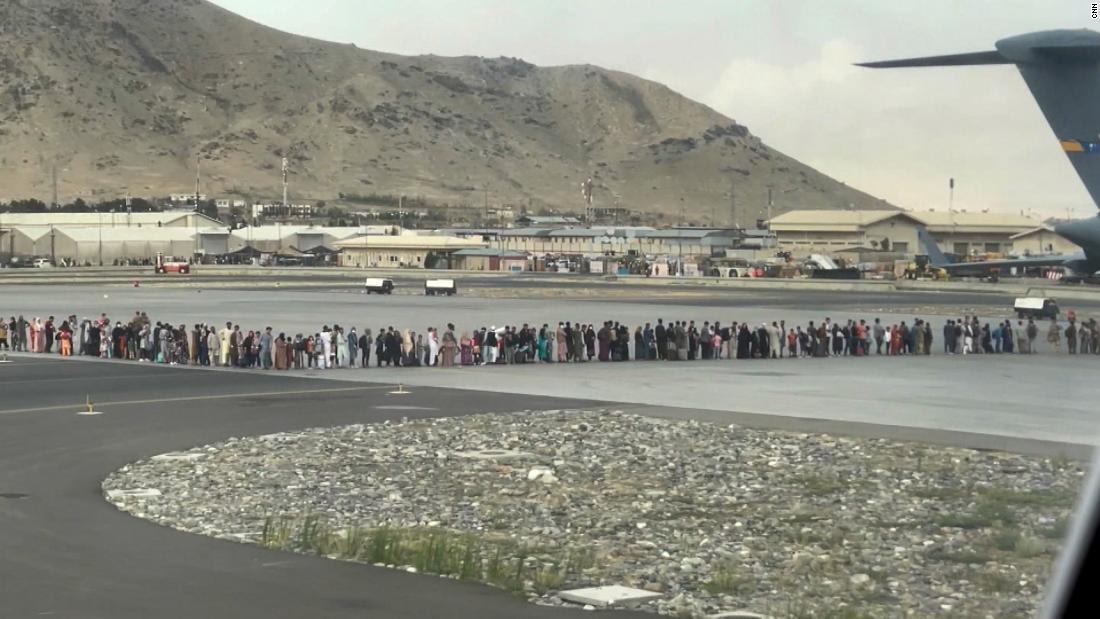Biden faces pressure from US allies to extend August 31 exit deadline
Leaders of the Group of 7 will meet in a virtual gathering on Tuesday, the first such international forum since the crisis in Afghanistan unfolded. With the August 31 deadline for US troops to withdraw from Afghanistan fast approaching, America’s allies are expected to press Biden to extend the military deployment.
Biden has so far not publicly committed to such a move, worrying some allies who fear there won’t be enough time to get their citizens, along with Afghan allies who assisted in the war effort, out of the country by the end of the month.
The US evacuated a record 12,700 people from Kabul airport between Monday and Tuesday morning, according to a White House official, and another 8,900 people were evacuated by 57 coalition flights. The US has now evacuated some 58,700 people from Afghanistan since August 14.
The US military has advised Biden that he must decide by Tuesday whether to extend the evacuation beyond August 31, according to a defense official directly familiar with the discussions, though Biden has yet to make a decision.
Speaking ahead of the G7 meeting Tuesday, UK Defense Secretary Ben Wallace told Sky News he thought it was “unlikely” Biden would extend the deadline date, though he added “it is definitely worth a try, and we will.”
German Foreign Minister Heiko Maas advocated for negotiating with the Taliban on the deadline. “As bitter as it is, we need to talk to the Taliban,” Maas said in a tweet. “The alternative would be to abandon these people. And we are not willing to do that.”
But the Taliban has described August 31 as a “red line” and threatened consequences if the White House moves to delay the US withdrawal.
US military advisers have told the White House that the decision must be made by Tuesday in order to have enough time to withdraw the 5,800 troops currently on the ground, as well as their equipment and weapons. If the President sticks to the August 31 deadline, the military anticipates “a few more days” of trying to evacuate as many people as possible before the drawdown of US forces begins, possibly at the end of this week.
Several of Biden’s advisers have advised against an extension, citing the security situation on the ground, CNN has learned.
US evacuates record number from airport
The number of evacuees in and around Kabul airport swelled to around 20,000 over the weekend. But the pace of airlifts has sharply picked up in recent days, and as of Tuesday afternoon there were 4,671 people awaiting flights, Lieutenant Colonel Brett Lea told CNN.
SIV applicants were told not to come to the airport on Monday as the US tried to clear backlogs of evacuees and ensure US passport and green card holders got on aircraft out of Kabul before the August 31 deadline to complete evacuations.
But solid estimates of the number of people both on and leaving the airport were hard to determine.
The Pentagon said early Tuesday that 17 US military and partner nation aircraft evacuated approximately 16,000 people from Harmid Karzai International Airport within the previous 24 hours, with the US Air Force transporting just under 11,000 of them.
That gave an opening to expand the evacuation, the source said.
“The aperture has widened,” they said. SIV holders plus immediate family and anyone who can “clearly and credibly articulate a clear and credible connection” with the US government could now get out, the source said.
Despite that relaxation of restrictions, the gates to the airport remained closed, the source said.
“But the people who are already there or being pulled in individually, they’re flexing a bit,” they said.
About 300 US citizens had been brought in overnight, and moves were coordinated with the Taliban, the source said. The closure of the airport’s gates, however, significantly reduces the number of SIV applicants who can reach the base.
Afghan security forces continued to use unofficial means to get their colleagues and friends onto the base, the source said. “Not sure who the Afghans are still pulling in, but it seems to be a steady trickle,” they said.
The source also said there had been no progress in the evacuation of locally employed embassy staff, although planning was underway.
While the backlog of evacuees was being whittled down in Kabul, strain was showing up elsewhere in the route that would eventually lead evacuees to resettlement outside Afghanistan.
One of the main waypoints for evacuees, the massive US Ramstein Air Base in Germany, had reached its capacity of 7,800 evacuees on Monday.
Harrowing reports of executions
The frantic evacuation race comes against the backdrop of “harrowing and credible reports” of civilian executions and restrictions on women’s rights under the Taliban in Afghanistan, UN High Commissioner for Human Rights Michelle Bachelet said Tuesday.
The reports included executions of civilians and members of the Afghan security forces, restrictions on girls’ right to attend schools, recruitment of child soldiers, and repression of peaceful protest, Bachalet told the UN’s Human Rights Council in Geneva.
“Many people now fear reprisals by the Taliban against those working with the government or the international community; people who have worked to advance human rights and justice; or those whose lifestyles and opinions are simply perceived to be opposed to the Taliban ideology,” Bachalet said.
The reports of violence lie in stark contrast to Taliban assurances to international media since seizing Kabul over a week ago. Taliban leaders said they would not seek retribution against their political enemies and did not want women to be discriminated against, with their standing in society guaranteed “within the framework of Islamic sharia” law.
CNN’s Nick Paton Walsh reported from Doha, Sheena McKenzie wrote from London and Brad Lendon wrote from Hong Kong. Nicole Gaouette, Barbara Starr, Jennifer Hansler, Kylie Atwood, Kevin Liptak, Mick Krever, Inke Kappeler, Sharon Braithwaite, Claudia Rebaza and Amy Cassidy contributed to this report.
![]()


